Analysis of Emotional and Cultural Intelligence in Leadership Report
VerifiedAdded on 2023/01/07
|10
|3218
|67
Report
AI Summary
This report delves into the crucial roles of emotional and cultural intelligence in leadership, emphasizing self-awareness and continuous self-development as key factors for future success. The report explores how these elements contribute to effective leadership, examining two critical incidents through self-analysis toolkits (Belbin and Emotional Intelligence questionnaires) to reflect on personal strengths, weaknesses, and behavioral patterns. The analysis highlights the importance of recognizing and managing emotions, adapting to cultural differences, and fostering self-improvement. The report discusses the practical implications of these insights for becoming a more effective leader and team worker, focusing on the importance of understanding both personal capabilities and the dynamics of interpersonal relationships within a team setting. It emphasizes the need for leaders to cultivate self-awareness and continuous self-development to navigate diverse perspectives, motivate others, and successfully fulfill their leadership responsibilities.
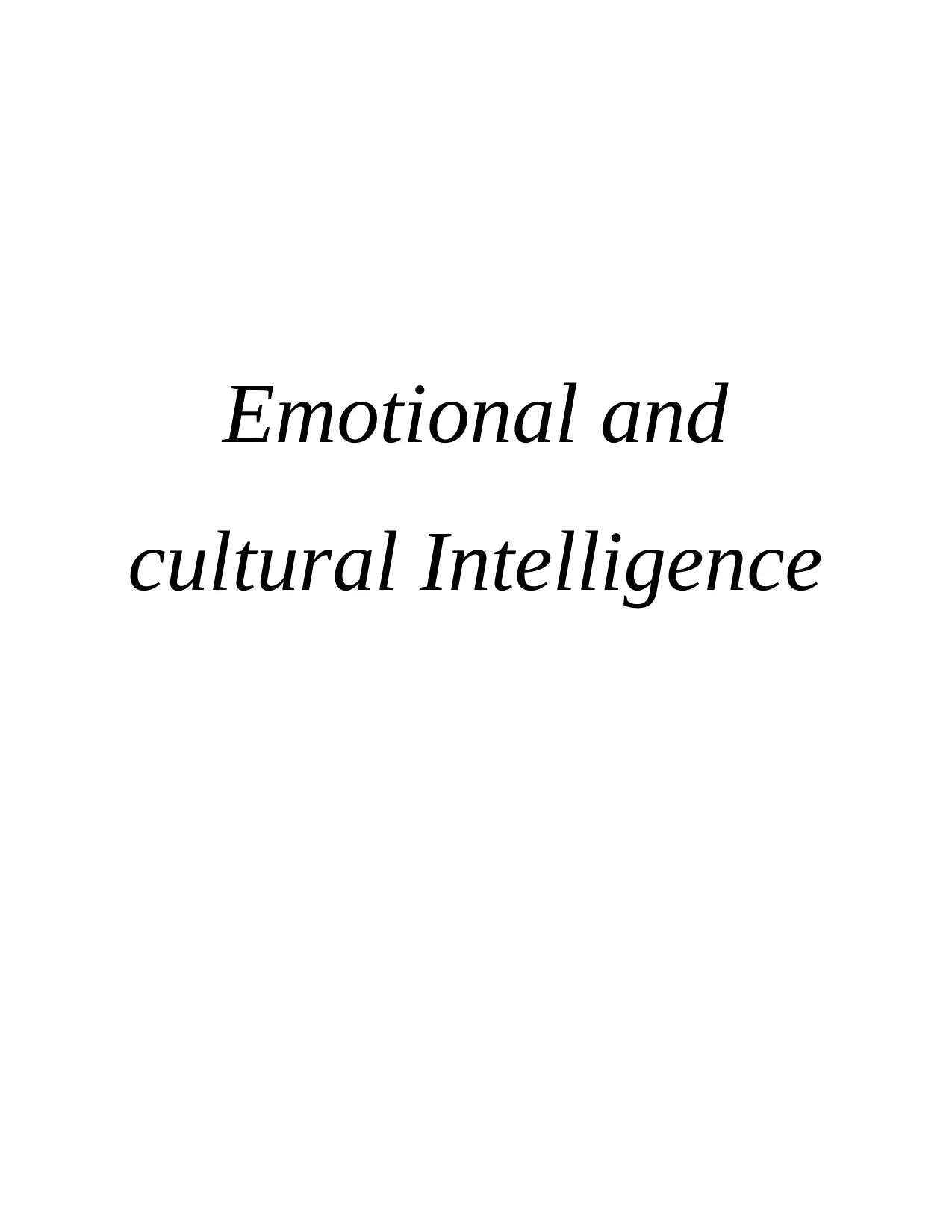
Emotional and
cultural Intelligence
cultural Intelligence
Paraphrase This Document
Need a fresh take? Get an instant paraphrase of this document with our AI Paraphraser
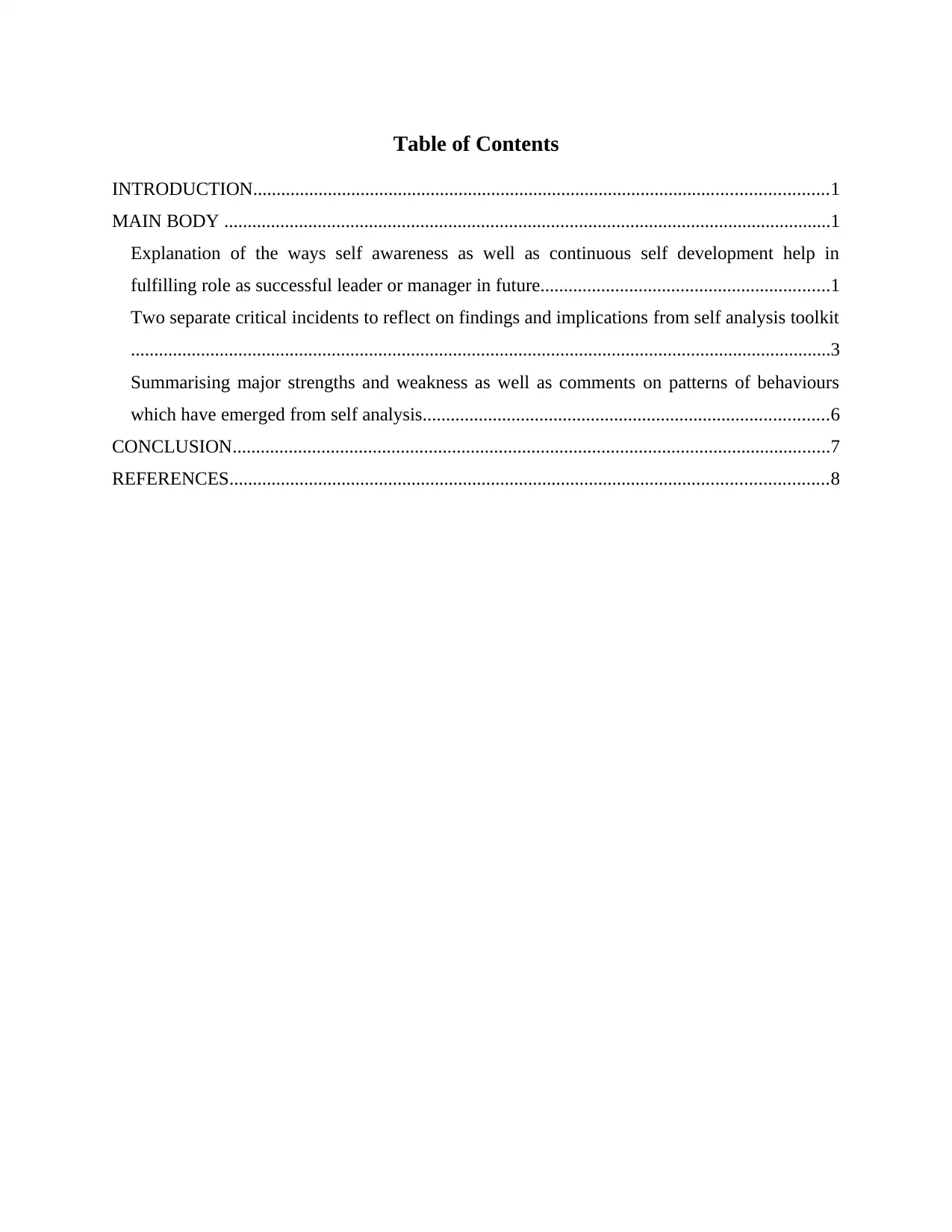
Table of Contents
INTRODUCTION...........................................................................................................................1
MAIN BODY ..................................................................................................................................1
Explanation of the ways self awareness as well as continuous self development help in
fulfilling role as successful leader or manager in future..............................................................1
Two separate critical incidents to reflect on findings and implications from self analysis toolkit
......................................................................................................................................................3
Summarising major strengths and weakness as well as comments on patterns of behaviours
which have emerged from self analysis.......................................................................................6
CONCLUSION................................................................................................................................7
REFERENCES................................................................................................................................8
INTRODUCTION...........................................................................................................................1
MAIN BODY ..................................................................................................................................1
Explanation of the ways self awareness as well as continuous self development help in
fulfilling role as successful leader or manager in future..............................................................1
Two separate critical incidents to reflect on findings and implications from self analysis toolkit
......................................................................................................................................................3
Summarising major strengths and weakness as well as comments on patterns of behaviours
which have emerged from self analysis.......................................................................................6
CONCLUSION................................................................................................................................7
REFERENCES................................................................................................................................8
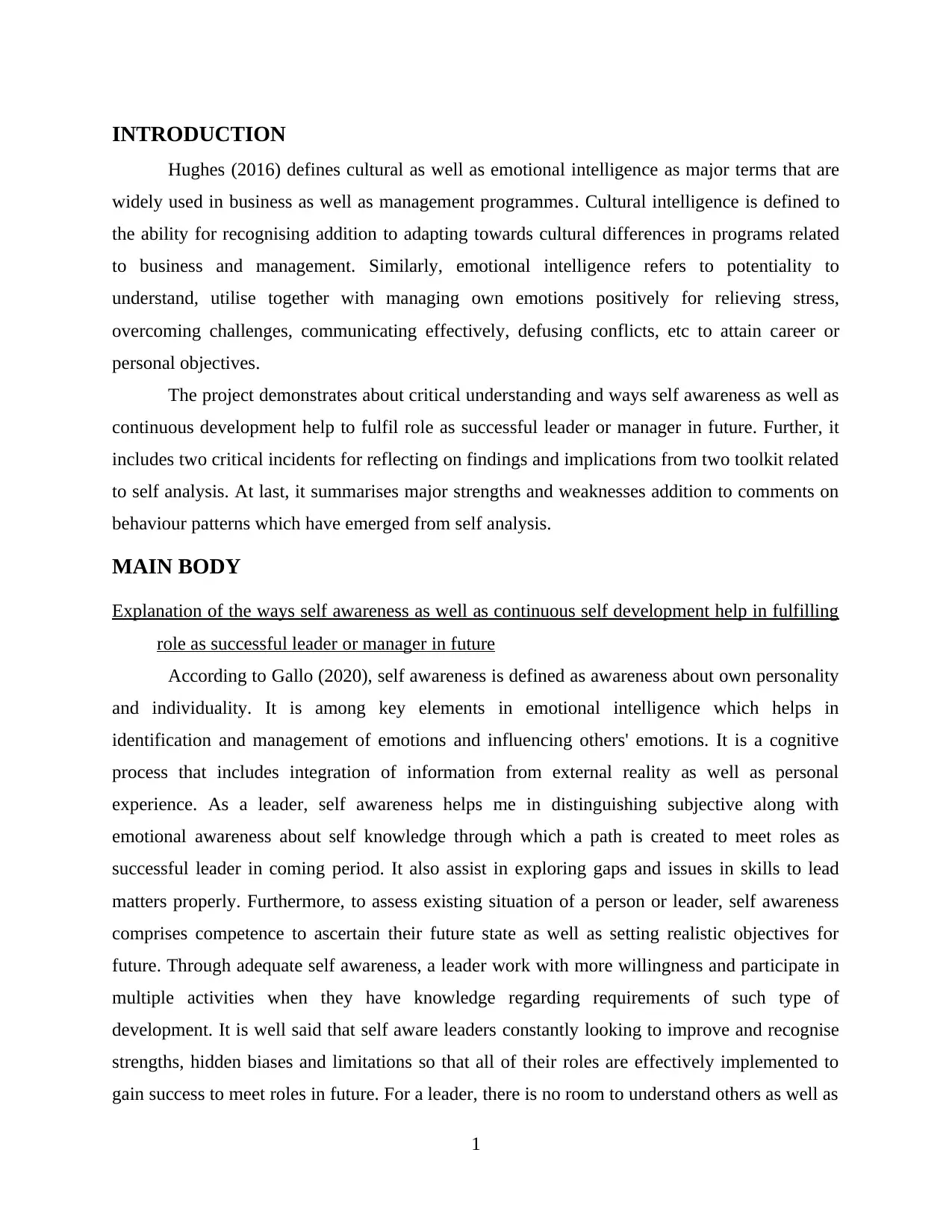
INTRODUCTION
Hughes (2016) defines cultural as well as emotional intelligence as major terms that are
widely used in business as well as management programmes. Cultural intelligence is defined to
the ability for recognising addition to adapting towards cultural differences in programs related
to business and management. Similarly, emotional intelligence refers to potentiality to
understand, utilise together with managing own emotions positively for relieving stress,
overcoming challenges, communicating effectively, defusing conflicts, etc to attain career or
personal objectives.
The project demonstrates about critical understanding and ways self awareness as well as
continuous development help to fulfil role as successful leader or manager in future. Further, it
includes two critical incidents for reflecting on findings and implications from two toolkit related
to self analysis. At last, it summarises major strengths and weaknesses addition to comments on
behaviour patterns which have emerged from self analysis.
MAIN BODY
Explanation of the ways self awareness as well as continuous self development help in fulfilling
role as successful leader or manager in future
According to Gallo (2020), self awareness is defined as awareness about own personality
and individuality. It is among key elements in emotional intelligence which helps in
identification and management of emotions and influencing others' emotions. It is a cognitive
process that includes integration of information from external reality as well as personal
experience. As a leader, self awareness helps me in distinguishing subjective along with
emotional awareness about self knowledge through which a path is created to meet roles as
successful leader in coming period. It also assist in exploring gaps and issues in skills to lead
matters properly. Furthermore, to assess existing situation of a person or leader, self awareness
comprises competence to ascertain their future state as well as setting realistic objectives for
future. Through adequate self awareness, a leader work with more willingness and participate in
multiple activities when they have knowledge regarding requirements of such type of
development. It is well said that self aware leaders constantly looking to improve and recognise
strengths, hidden biases and limitations so that all of their roles are effectively implemented to
gain success to meet roles in future. For a leader, there is no room to understand others as well as
1
Hughes (2016) defines cultural as well as emotional intelligence as major terms that are
widely used in business as well as management programmes. Cultural intelligence is defined to
the ability for recognising addition to adapting towards cultural differences in programs related
to business and management. Similarly, emotional intelligence refers to potentiality to
understand, utilise together with managing own emotions positively for relieving stress,
overcoming challenges, communicating effectively, defusing conflicts, etc to attain career or
personal objectives.
The project demonstrates about critical understanding and ways self awareness as well as
continuous development help to fulfil role as successful leader or manager in future. Further, it
includes two critical incidents for reflecting on findings and implications from two toolkit related
to self analysis. At last, it summarises major strengths and weaknesses addition to comments on
behaviour patterns which have emerged from self analysis.
MAIN BODY
Explanation of the ways self awareness as well as continuous self development help in fulfilling
role as successful leader or manager in future
According to Gallo (2020), self awareness is defined as awareness about own personality
and individuality. It is among key elements in emotional intelligence which helps in
identification and management of emotions and influencing others' emotions. It is a cognitive
process that includes integration of information from external reality as well as personal
experience. As a leader, self awareness helps me in distinguishing subjective along with
emotional awareness about self knowledge through which a path is created to meet roles as
successful leader in coming period. It also assist in exploring gaps and issues in skills to lead
matters properly. Furthermore, to assess existing situation of a person or leader, self awareness
comprises competence to ascertain their future state as well as setting realistic objectives for
future. Through adequate self awareness, a leader work with more willingness and participate in
multiple activities when they have knowledge regarding requirements of such type of
development. It is well said that self aware leaders constantly looking to improve and recognise
strengths, hidden biases and limitations so that all of their roles are effectively implemented to
gain success to meet roles in future. For a leader, there is no room to understand others as well as
1
⊘ This is a preview!⊘
Do you want full access?
Subscribe today to unlock all pages.

Trusted by 1+ million students worldwide
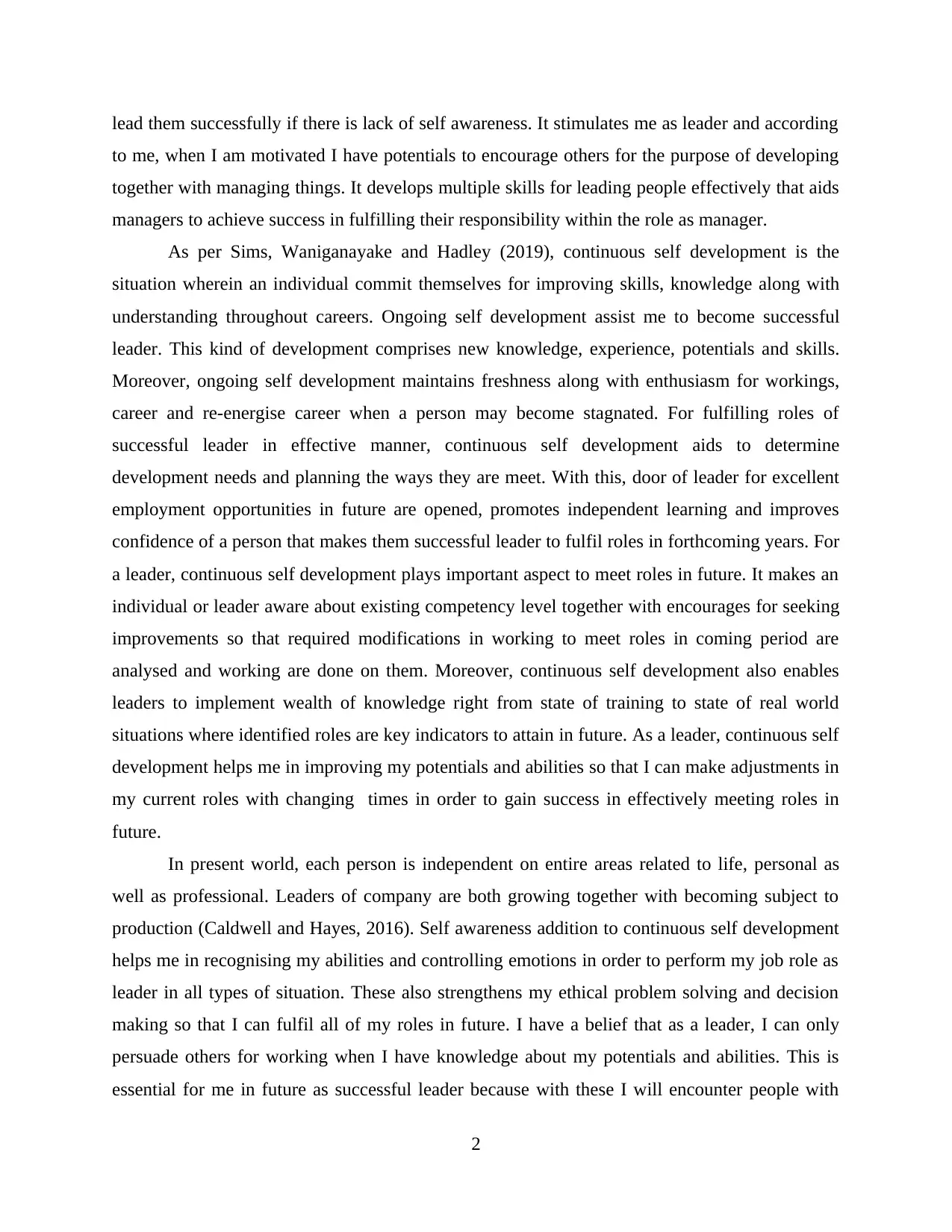
lead them successfully if there is lack of self awareness. It stimulates me as leader and according
to me, when I am motivated I have potentials to encourage others for the purpose of developing
together with managing things. It develops multiple skills for leading people effectively that aids
managers to achieve success in fulfilling their responsibility within the role as manager.
As per Sims, Waniganayake and Hadley (2019), continuous self development is the
situation wherein an individual commit themselves for improving skills, knowledge along with
understanding throughout careers. Ongoing self development assist me to become successful
leader. This kind of development comprises new knowledge, experience, potentials and skills.
Moreover, ongoing self development maintains freshness along with enthusiasm for workings,
career and re-energise career when a person may become stagnated. For fulfilling roles of
successful leader in effective manner, continuous self development aids to determine
development needs and planning the ways they are meet. With this, door of leader for excellent
employment opportunities in future are opened, promotes independent learning and improves
confidence of a person that makes them successful leader to fulfil roles in forthcoming years. For
a leader, continuous self development plays important aspect to meet roles in future. It makes an
individual or leader aware about existing competency level together with encourages for seeking
improvements so that required modifications in working to meet roles in coming period are
analysed and working are done on them. Moreover, continuous self development also enables
leaders to implement wealth of knowledge right from state of training to state of real world
situations where identified roles are key indicators to attain in future. As a leader, continuous self
development helps me in improving my potentials and abilities so that I can make adjustments in
my current roles with changing times in order to gain success in effectively meeting roles in
future.
In present world, each person is independent on entire areas related to life, personal as
well as professional. Leaders of company are both growing together with becoming subject to
production (Caldwell and Hayes, 2016). Self awareness addition to continuous self development
helps me in recognising my abilities and controlling emotions in order to perform my job role as
leader in all types of situation. These also strengthens my ethical problem solving and decision
making so that I can fulfil all of my roles in future. I have a belief that as a leader, I can only
persuade others for working when I have knowledge about my potentials and abilities. This is
essential for me in future as successful leader because with these I will encounter people with
2
to me, when I am motivated I have potentials to encourage others for the purpose of developing
together with managing things. It develops multiple skills for leading people effectively that aids
managers to achieve success in fulfilling their responsibility within the role as manager.
As per Sims, Waniganayake and Hadley (2019), continuous self development is the
situation wherein an individual commit themselves for improving skills, knowledge along with
understanding throughout careers. Ongoing self development assist me to become successful
leader. This kind of development comprises new knowledge, experience, potentials and skills.
Moreover, ongoing self development maintains freshness along with enthusiasm for workings,
career and re-energise career when a person may become stagnated. For fulfilling roles of
successful leader in effective manner, continuous self development aids to determine
development needs and planning the ways they are meet. With this, door of leader for excellent
employment opportunities in future are opened, promotes independent learning and improves
confidence of a person that makes them successful leader to fulfil roles in forthcoming years. For
a leader, continuous self development plays important aspect to meet roles in future. It makes an
individual or leader aware about existing competency level together with encourages for seeking
improvements so that required modifications in working to meet roles in coming period are
analysed and working are done on them. Moreover, continuous self development also enables
leaders to implement wealth of knowledge right from state of training to state of real world
situations where identified roles are key indicators to attain in future. As a leader, continuous self
development helps me in improving my potentials and abilities so that I can make adjustments in
my current roles with changing times in order to gain success in effectively meeting roles in
future.
In present world, each person is independent on entire areas related to life, personal as
well as professional. Leaders of company are both growing together with becoming subject to
production (Caldwell and Hayes, 2016). Self awareness addition to continuous self development
helps me in recognising my abilities and controlling emotions in order to perform my job role as
leader in all types of situation. These also strengthens my ethical problem solving and decision
making so that I can fulfil all of my roles in future. I have a belief that as a leader, I can only
persuade others for working when I have knowledge about my potentials and abilities. This is
essential for me in future as successful leader because with these I will encounter people with
2
Paraphrase This Document
Need a fresh take? Get an instant paraphrase of this document with our AI Paraphraser
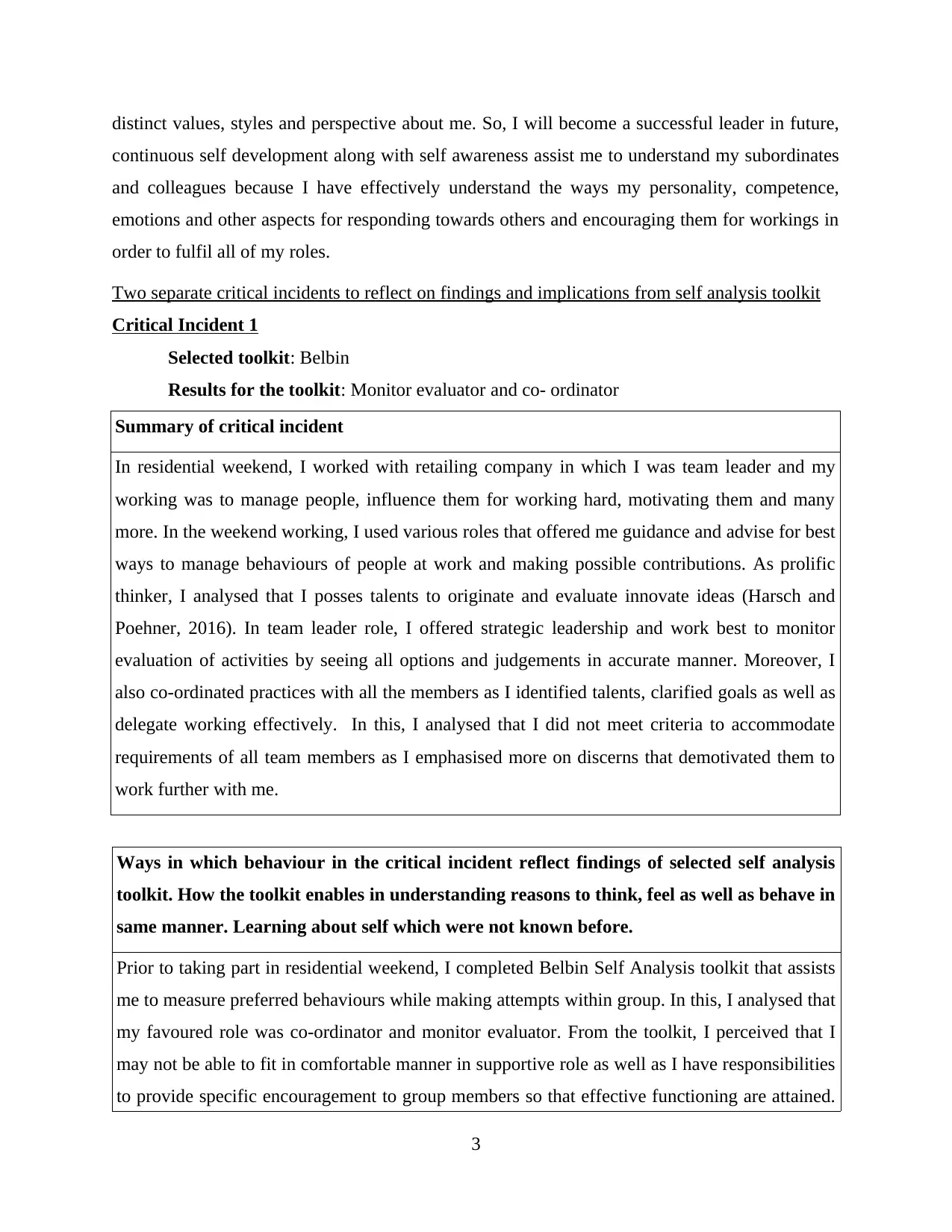
distinct values, styles and perspective about me. So, I will become a successful leader in future,
continuous self development along with self awareness assist me to understand my subordinates
and colleagues because I have effectively understand the ways my personality, competence,
emotions and other aspects for responding towards others and encouraging them for workings in
order to fulfil all of my roles.
Two separate critical incidents to reflect on findings and implications from self analysis toolkit
Critical Incident 1
Selected toolkit: Belbin
Results for the toolkit: Monitor evaluator and co- ordinator
Summary of critical incident
In residential weekend, I worked with retailing company in which I was team leader and my
working was to manage people, influence them for working hard, motivating them and many
more. In the weekend working, I used various roles that offered me guidance and advise for best
ways to manage behaviours of people at work and making possible contributions. As prolific
thinker, I analysed that I posses talents to originate and evaluate innovate ideas (Harsch and
Poehner, 2016). In team leader role, I offered strategic leadership and work best to monitor
evaluation of activities by seeing all options and judgements in accurate manner. Moreover, I
also co-ordinated practices with all the members as I identified talents, clarified goals as well as
delegate working effectively. In this, I analysed that I did not meet criteria to accommodate
requirements of all team members as I emphasised more on discerns that demotivated them to
work further with me.
Ways in which behaviour in the critical incident reflect findings of selected self analysis
toolkit. How the toolkit enables in understanding reasons to think, feel as well as behave in
same manner. Learning about self which were not known before.
Prior to taking part in residential weekend, I completed Belbin Self Analysis toolkit that assists
me to measure preferred behaviours while making attempts within group. In this, I analysed that
my favoured role was co-ordinator and monitor evaluator. From the toolkit, I perceived that I
may not be able to fit in comfortable manner in supportive role as well as I have responsibilities
to provide specific encouragement to group members so that effective functioning are attained.
3
continuous self development along with self awareness assist me to understand my subordinates
and colleagues because I have effectively understand the ways my personality, competence,
emotions and other aspects for responding towards others and encouraging them for workings in
order to fulfil all of my roles.
Two separate critical incidents to reflect on findings and implications from self analysis toolkit
Critical Incident 1
Selected toolkit: Belbin
Results for the toolkit: Monitor evaluator and co- ordinator
Summary of critical incident
In residential weekend, I worked with retailing company in which I was team leader and my
working was to manage people, influence them for working hard, motivating them and many
more. In the weekend working, I used various roles that offered me guidance and advise for best
ways to manage behaviours of people at work and making possible contributions. As prolific
thinker, I analysed that I posses talents to originate and evaluate innovate ideas (Harsch and
Poehner, 2016). In team leader role, I offered strategic leadership and work best to monitor
evaluation of activities by seeing all options and judgements in accurate manner. Moreover, I
also co-ordinated practices with all the members as I identified talents, clarified goals as well as
delegate working effectively. In this, I analysed that I did not meet criteria to accommodate
requirements of all team members as I emphasised more on discerns that demotivated them to
work further with me.
Ways in which behaviour in the critical incident reflect findings of selected self analysis
toolkit. How the toolkit enables in understanding reasons to think, feel as well as behave in
same manner. Learning about self which were not known before.
Prior to taking part in residential weekend, I completed Belbin Self Analysis toolkit that assists
me to measure preferred behaviours while making attempts within group. In this, I analysed that
my favoured role was co-ordinator and monitor evaluator. From the toolkit, I perceived that I
may not be able to fit in comfortable manner in supportive role as well as I have responsibilities
to provide specific encouragement to group members so that effective functioning are attained.
3
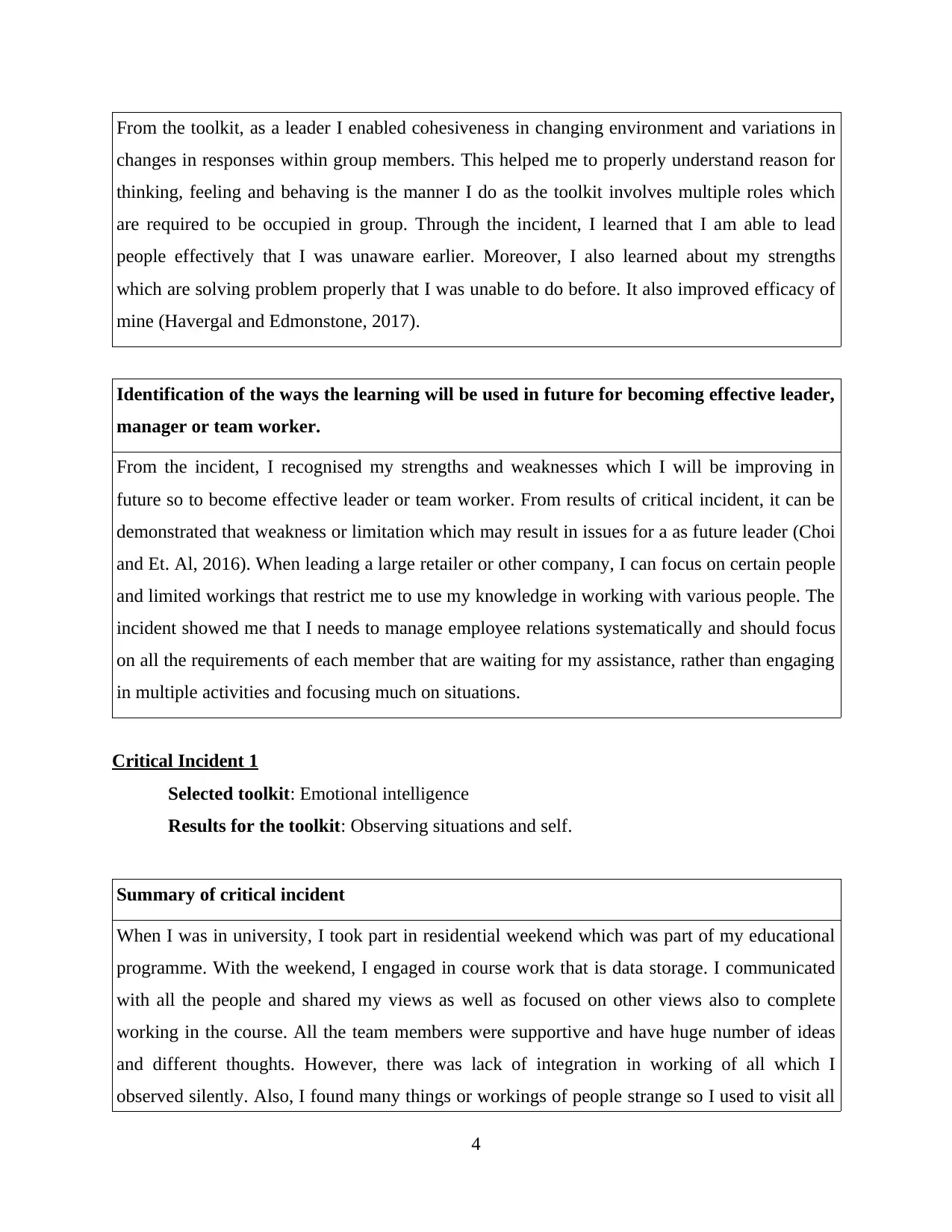
From the toolkit, as a leader I enabled cohesiveness in changing environment and variations in
changes in responses within group members. This helped me to properly understand reason for
thinking, feeling and behaving is the manner I do as the toolkit involves multiple roles which
are required to be occupied in group. Through the incident, I learned that I am able to lead
people effectively that I was unaware earlier. Moreover, I also learned about my strengths
which are solving problem properly that I was unable to do before. It also improved efficacy of
mine (Havergal and Edmonstone, 2017).
Identification of the ways the learning will be used in future for becoming effective leader,
manager or team worker.
From the incident, I recognised my strengths and weaknesses which I will be improving in
future so to become effective leader or team worker. From results of critical incident, it can be
demonstrated that weakness or limitation which may result in issues for a as future leader (Choi
and Et. Al, 2016). When leading a large retailer or other company, I can focus on certain people
and limited workings that restrict me to use my knowledge in working with various people. The
incident showed me that I needs to manage employee relations systematically and should focus
on all the requirements of each member that are waiting for my assistance, rather than engaging
in multiple activities and focusing much on situations.
Critical Incident 1
Selected toolkit: Emotional intelligence
Results for the toolkit: Observing situations and self.
Summary of critical incident
When I was in university, I took part in residential weekend which was part of my educational
programme. With the weekend, I engaged in course work that is data storage. I communicated
with all the people and shared my views as well as focused on other views also to complete
working in the course. All the team members were supportive and have huge number of ideas
and different thoughts. However, there was lack of integration in working of all which I
observed silently. Also, I found many things or workings of people strange so I used to visit all
4
changes in responses within group members. This helped me to properly understand reason for
thinking, feeling and behaving is the manner I do as the toolkit involves multiple roles which
are required to be occupied in group. Through the incident, I learned that I am able to lead
people effectively that I was unaware earlier. Moreover, I also learned about my strengths
which are solving problem properly that I was unable to do before. It also improved efficacy of
mine (Havergal and Edmonstone, 2017).
Identification of the ways the learning will be used in future for becoming effective leader,
manager or team worker.
From the incident, I recognised my strengths and weaknesses which I will be improving in
future so to become effective leader or team worker. From results of critical incident, it can be
demonstrated that weakness or limitation which may result in issues for a as future leader (Choi
and Et. Al, 2016). When leading a large retailer or other company, I can focus on certain people
and limited workings that restrict me to use my knowledge in working with various people. The
incident showed me that I needs to manage employee relations systematically and should focus
on all the requirements of each member that are waiting for my assistance, rather than engaging
in multiple activities and focusing much on situations.
Critical Incident 1
Selected toolkit: Emotional intelligence
Results for the toolkit: Observing situations and self.
Summary of critical incident
When I was in university, I took part in residential weekend which was part of my educational
programme. With the weekend, I engaged in course work that is data storage. I communicated
with all the people and shared my views as well as focused on other views also to complete
working in the course. All the team members were supportive and have huge number of ideas
and different thoughts. However, there was lack of integration in working of all which I
observed silently. Also, I found many things or workings of people strange so I used to visit all
4
⊘ This is a preview!⊘
Do you want full access?
Subscribe today to unlock all pages.

Trusted by 1+ million students worldwide
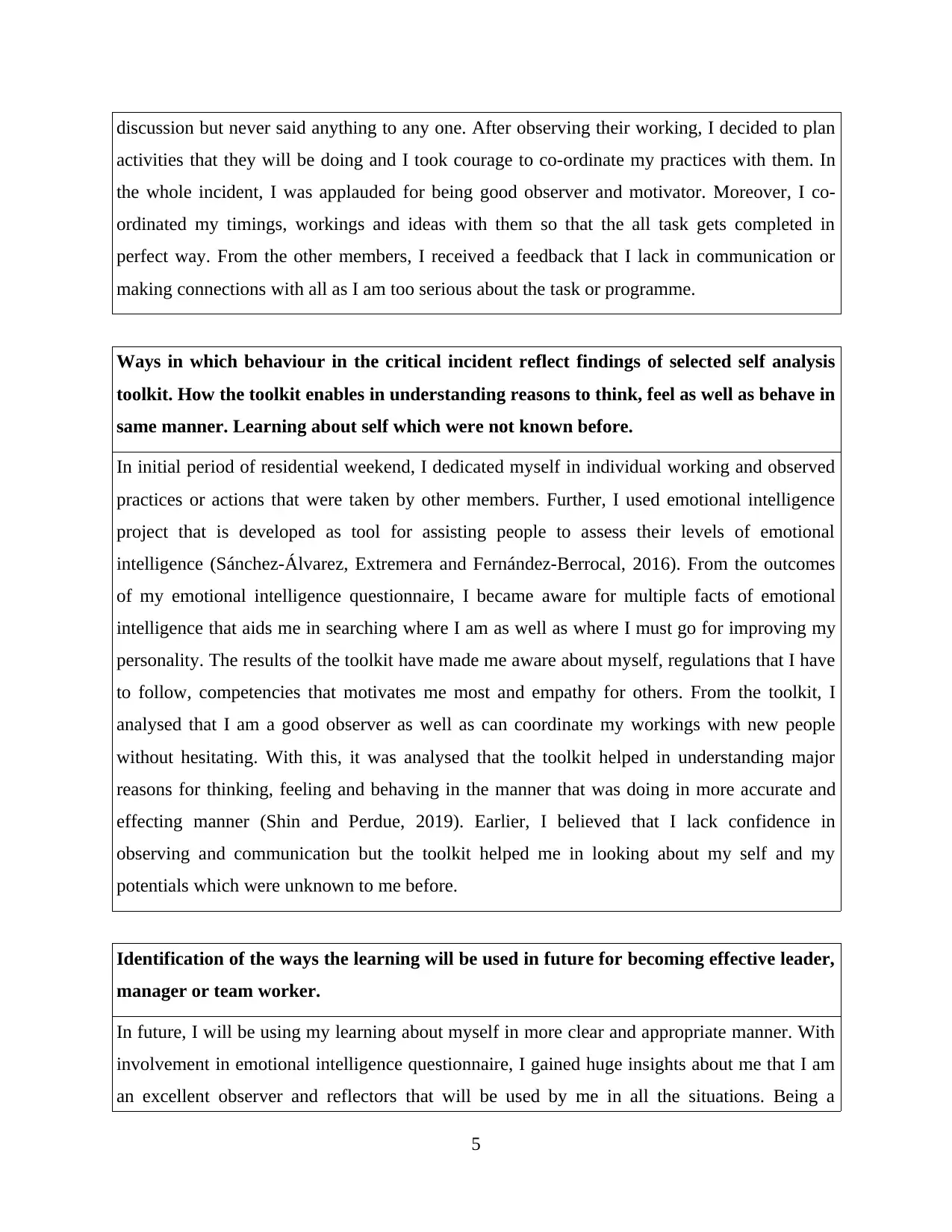
discussion but never said anything to any one. After observing their working, I decided to plan
activities that they will be doing and I took courage to co-ordinate my practices with them. In
the whole incident, I was applauded for being good observer and motivator. Moreover, I co-
ordinated my timings, workings and ideas with them so that the all task gets completed in
perfect way. From the other members, I received a feedback that I lack in communication or
making connections with all as I am too serious about the task or programme.
Ways in which behaviour in the critical incident reflect findings of selected self analysis
toolkit. How the toolkit enables in understanding reasons to think, feel as well as behave in
same manner. Learning about self which were not known before.
In initial period of residential weekend, I dedicated myself in individual working and observed
practices or actions that were taken by other members. Further, I used emotional intelligence
project that is developed as tool for assisting people to assess their levels of emotional
intelligence (Sánchez-Álvarez, Extremera and Fernández-Berrocal, 2016). From the outcomes
of my emotional intelligence questionnaire, I became aware for multiple facts of emotional
intelligence that aids me in searching where I am as well as where I must go for improving my
personality. The results of the toolkit have made me aware about myself, regulations that I have
to follow, competencies that motivates me most and empathy for others. From the toolkit, I
analysed that I am a good observer as well as can coordinate my workings with new people
without hesitating. With this, it was analysed that the toolkit helped in understanding major
reasons for thinking, feeling and behaving in the manner that was doing in more accurate and
effecting manner (Shin and Perdue, 2019). Earlier, I believed that I lack confidence in
observing and communication but the toolkit helped me in looking about my self and my
potentials which were unknown to me before.
Identification of the ways the learning will be used in future for becoming effective leader,
manager or team worker.
In future, I will be using my learning about myself in more clear and appropriate manner. With
involvement in emotional intelligence questionnaire, I gained huge insights about me that I am
an excellent observer and reflectors that will be used by me in all the situations. Being a
5
activities that they will be doing and I took courage to co-ordinate my practices with them. In
the whole incident, I was applauded for being good observer and motivator. Moreover, I co-
ordinated my timings, workings and ideas with them so that the all task gets completed in
perfect way. From the other members, I received a feedback that I lack in communication or
making connections with all as I am too serious about the task or programme.
Ways in which behaviour in the critical incident reflect findings of selected self analysis
toolkit. How the toolkit enables in understanding reasons to think, feel as well as behave in
same manner. Learning about self which were not known before.
In initial period of residential weekend, I dedicated myself in individual working and observed
practices or actions that were taken by other members. Further, I used emotional intelligence
project that is developed as tool for assisting people to assess their levels of emotional
intelligence (Sánchez-Álvarez, Extremera and Fernández-Berrocal, 2016). From the outcomes
of my emotional intelligence questionnaire, I became aware for multiple facts of emotional
intelligence that aids me in searching where I am as well as where I must go for improving my
personality. The results of the toolkit have made me aware about myself, regulations that I have
to follow, competencies that motivates me most and empathy for others. From the toolkit, I
analysed that I am a good observer as well as can coordinate my workings with new people
without hesitating. With this, it was analysed that the toolkit helped in understanding major
reasons for thinking, feeling and behaving in the manner that was doing in more accurate and
effecting manner (Shin and Perdue, 2019). Earlier, I believed that I lack confidence in
observing and communication but the toolkit helped me in looking about my self and my
potentials which were unknown to me before.
Identification of the ways the learning will be used in future for becoming effective leader,
manager or team worker.
In future, I will be using my learning about myself in more clear and appropriate manner. With
involvement in emotional intelligence questionnaire, I gained huge insights about me that I am
an excellent observer and reflectors that will be used by me in all the situations. Being a
5
Paraphrase This Document
Need a fresh take? Get an instant paraphrase of this document with our AI Paraphraser
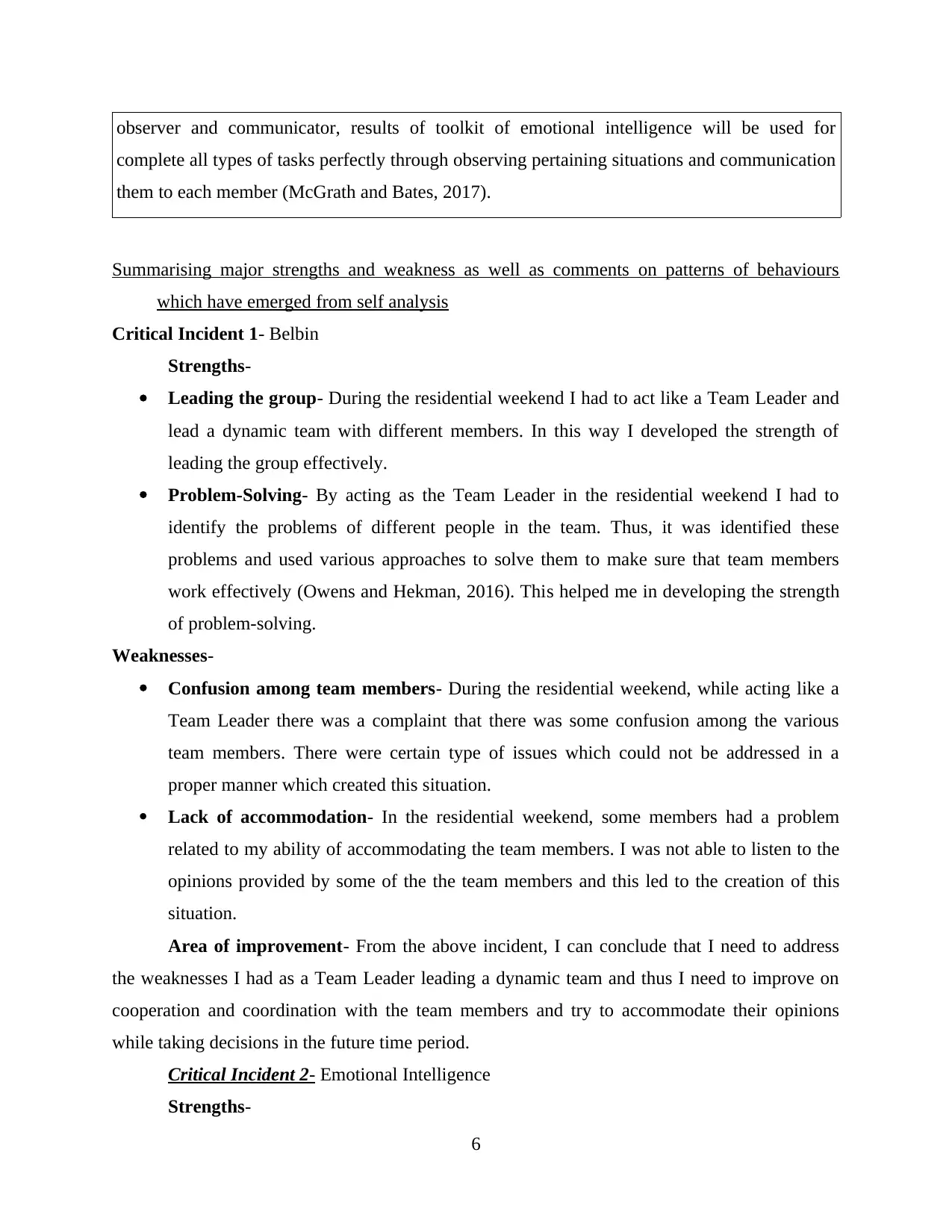
observer and communicator, results of toolkit of emotional intelligence will be used for
complete all types of tasks perfectly through observing pertaining situations and communication
them to each member (McGrath and Bates, 2017).
Summarising major strengths and weakness as well as comments on patterns of behaviours
which have emerged from self analysis
Critical Incident 1- Belbin
Strengths-
Leading the group- During the residential weekend I had to act like a Team Leader and
lead a dynamic team with different members. In this way I developed the strength of
leading the group effectively.
Problem-Solving- By acting as the Team Leader in the residential weekend I had to
identify the problems of different people in the team. Thus, it was identified these
problems and used various approaches to solve them to make sure that team members
work effectively (Owens and Hekman, 2016). This helped me in developing the strength
of problem-solving.
Weaknesses-
Confusion among team members- During the residential weekend, while acting like a
Team Leader there was a complaint that there was some confusion among the various
team members. There were certain type of issues which could not be addressed in a
proper manner which created this situation.
Lack of accommodation- In the residential weekend, some members had a problem
related to my ability of accommodating the team members. I was not able to listen to the
opinions provided by some of the the team members and this led to the creation of this
situation.
Area of improvement- From the above incident, I can conclude that I need to address
the weaknesses I had as a Team Leader leading a dynamic team and thus I need to improve on
cooperation and coordination with the team members and try to accommodate their opinions
while taking decisions in the future time period.
Critical Incident 2- Emotional Intelligence
Strengths-
6
complete all types of tasks perfectly through observing pertaining situations and communication
them to each member (McGrath and Bates, 2017).
Summarising major strengths and weakness as well as comments on patterns of behaviours
which have emerged from self analysis
Critical Incident 1- Belbin
Strengths-
Leading the group- During the residential weekend I had to act like a Team Leader and
lead a dynamic team with different members. In this way I developed the strength of
leading the group effectively.
Problem-Solving- By acting as the Team Leader in the residential weekend I had to
identify the problems of different people in the team. Thus, it was identified these
problems and used various approaches to solve them to make sure that team members
work effectively (Owens and Hekman, 2016). This helped me in developing the strength
of problem-solving.
Weaknesses-
Confusion among team members- During the residential weekend, while acting like a
Team Leader there was a complaint that there was some confusion among the various
team members. There were certain type of issues which could not be addressed in a
proper manner which created this situation.
Lack of accommodation- In the residential weekend, some members had a problem
related to my ability of accommodating the team members. I was not able to listen to the
opinions provided by some of the the team members and this led to the creation of this
situation.
Area of improvement- From the above incident, I can conclude that I need to address
the weaknesses I had as a Team Leader leading a dynamic team and thus I need to improve on
cooperation and coordination with the team members and try to accommodate their opinions
while taking decisions in the future time period.
Critical Incident 2- Emotional Intelligence
Strengths-
6
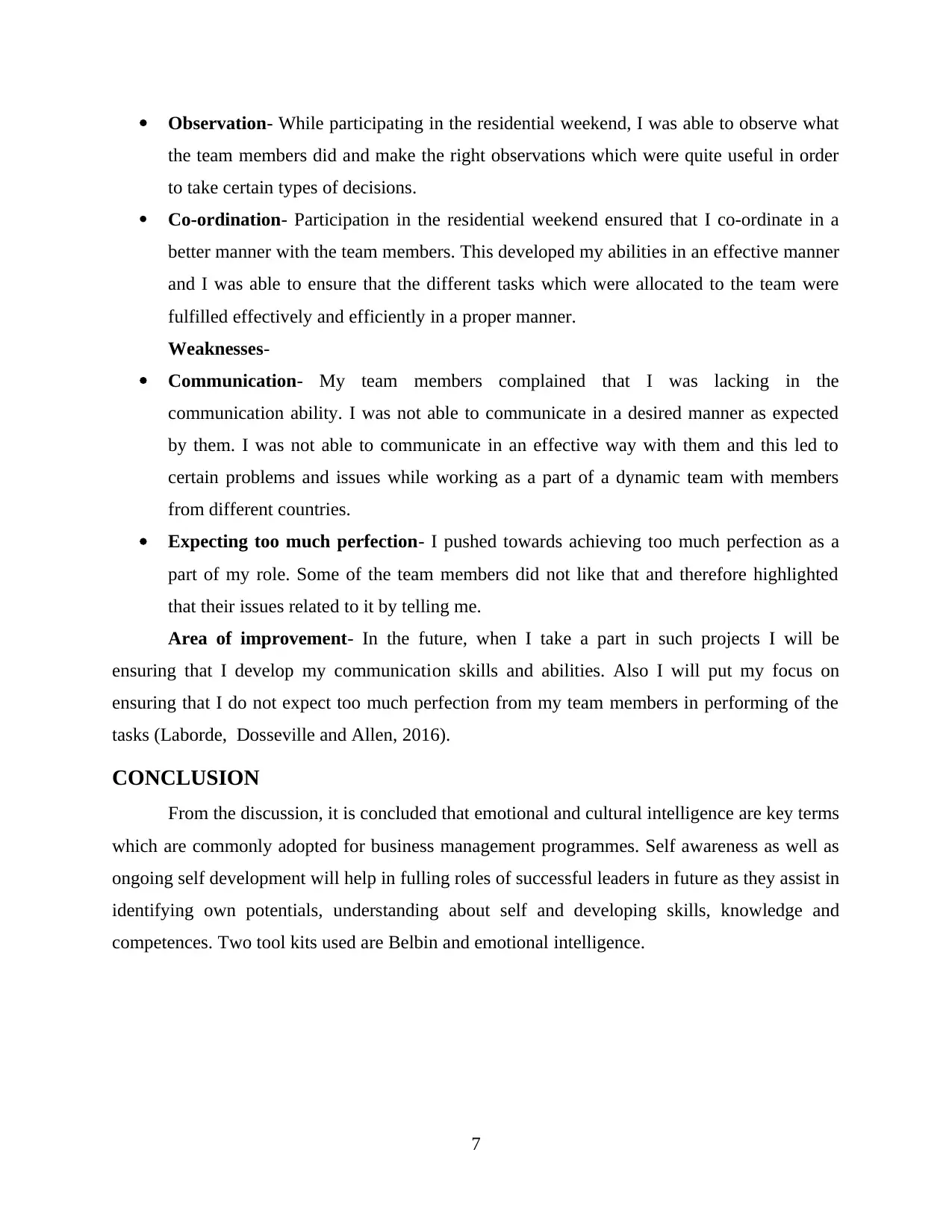
Observation- While participating in the residential weekend, I was able to observe what
the team members did and make the right observations which were quite useful in order
to take certain types of decisions.
Co-ordination- Participation in the residential weekend ensured that I co-ordinate in a
better manner with the team members. This developed my abilities in an effective manner
and I was able to ensure that the different tasks which were allocated to the team were
fulfilled effectively and efficiently in a proper manner.
Weaknesses-
Communication- My team members complained that I was lacking in the
communication ability. I was not able to communicate in a desired manner as expected
by them. I was not able to communicate in an effective way with them and this led to
certain problems and issues while working as a part of a dynamic team with members
from different countries.
Expecting too much perfection- I pushed towards achieving too much perfection as a
part of my role. Some of the team members did not like that and therefore highlighted
that their issues related to it by telling me.
Area of improvement- In the future, when I take a part in such projects I will be
ensuring that I develop my communication skills and abilities. Also I will put my focus on
ensuring that I do not expect too much perfection from my team members in performing of the
tasks (Laborde, Dosseville and Allen, 2016).
CONCLUSION
From the discussion, it is concluded that emotional and cultural intelligence are key terms
which are commonly adopted for business management programmes. Self awareness as well as
ongoing self development will help in fulling roles of successful leaders in future as they assist in
identifying own potentials, understanding about self and developing skills, knowledge and
competences. Two tool kits used are Belbin and emotional intelligence.
7
the team members did and make the right observations which were quite useful in order
to take certain types of decisions.
Co-ordination- Participation in the residential weekend ensured that I co-ordinate in a
better manner with the team members. This developed my abilities in an effective manner
and I was able to ensure that the different tasks which were allocated to the team were
fulfilled effectively and efficiently in a proper manner.
Weaknesses-
Communication- My team members complained that I was lacking in the
communication ability. I was not able to communicate in a desired manner as expected
by them. I was not able to communicate in an effective way with them and this led to
certain problems and issues while working as a part of a dynamic team with members
from different countries.
Expecting too much perfection- I pushed towards achieving too much perfection as a
part of my role. Some of the team members did not like that and therefore highlighted
that their issues related to it by telling me.
Area of improvement- In the future, when I take a part in such projects I will be
ensuring that I develop my communication skills and abilities. Also I will put my focus on
ensuring that I do not expect too much perfection from my team members in performing of the
tasks (Laborde, Dosseville and Allen, 2016).
CONCLUSION
From the discussion, it is concluded that emotional and cultural intelligence are key terms
which are commonly adopted for business management programmes. Self awareness as well as
ongoing self development will help in fulling roles of successful leaders in future as they assist in
identifying own potentials, understanding about self and developing skills, knowledge and
competences. Two tool kits used are Belbin and emotional intelligence.
7
⊘ This is a preview!⊘
Do you want full access?
Subscribe today to unlock all pages.

Trusted by 1+ million students worldwide
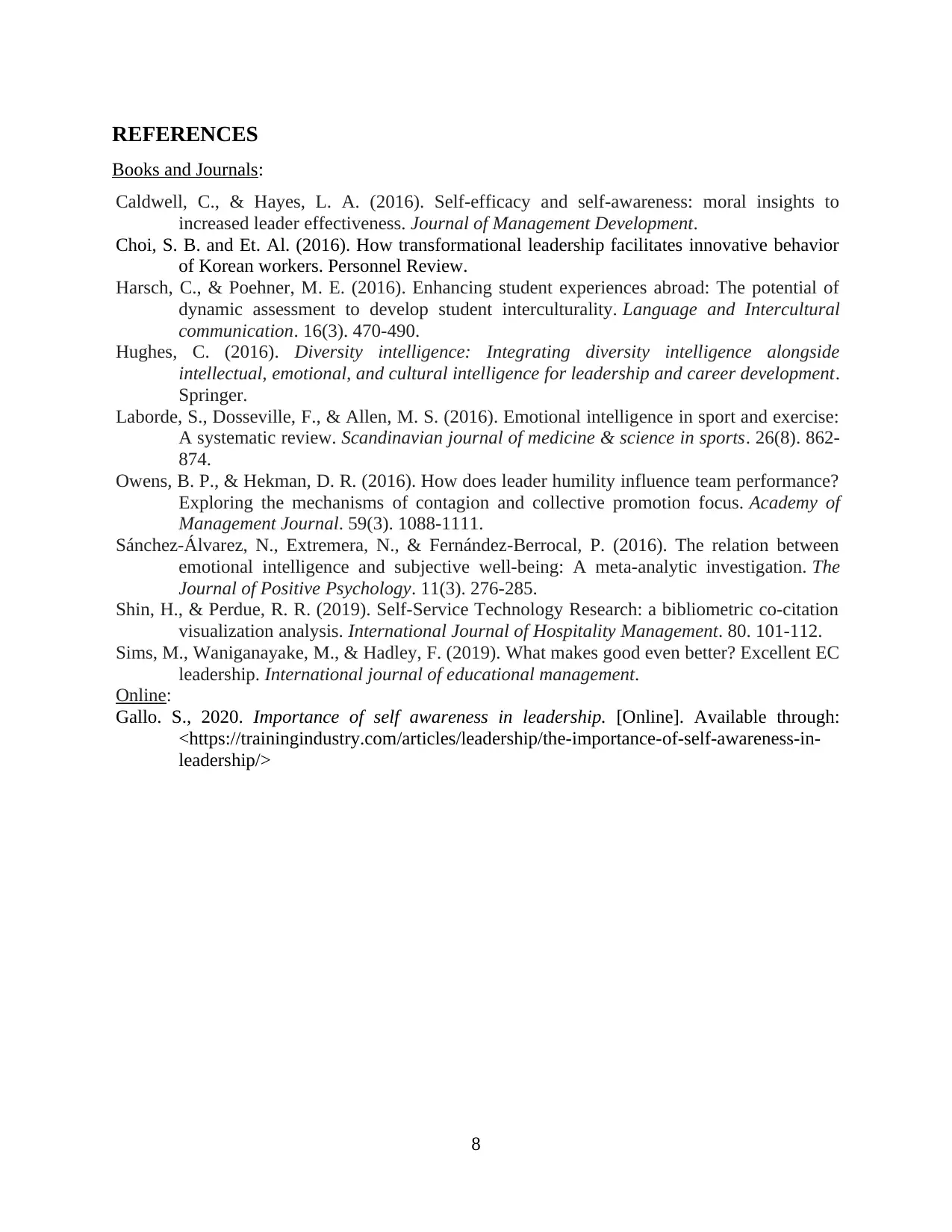
REFERENCES
Books and Journals:
Caldwell, C., & Hayes, L. A. (2016). Self-efficacy and self-awareness: moral insights to
increased leader effectiveness. Journal of Management Development.
Choi, S. B. and Et. Al. (2016). How transformational leadership facilitates innovative behavior
of Korean workers. Personnel Review.
Harsch, C., & Poehner, M. E. (2016). Enhancing student experiences abroad: The potential of
dynamic assessment to develop student interculturality. Language and Intercultural
communication. 16(3). 470-490.
Hughes, C. (2016). Diversity intelligence: Integrating diversity intelligence alongside
intellectual, emotional, and cultural intelligence for leadership and career development.
Springer.
Laborde, S., Dosseville, F., & Allen, M. S. (2016). Emotional intelligence in sport and exercise:
A systematic review. Scandinavian journal of medicine & science in sports. 26(8). 862-
874.
Owens, B. P., & Hekman, D. R. (2016). How does leader humility influence team performance?
Exploring the mechanisms of contagion and collective promotion focus. Academy of
Management Journal. 59(3). 1088-1111.
Sánchez-Álvarez, N., Extremera, N., & Fernández-Berrocal, P. (2016). The relation between
emotional intelligence and subjective well-being: A meta-analytic investigation. The
Journal of Positive Psychology. 11(3). 276-285.
Shin, H., & Perdue, R. R. (2019). Self-Service Technology Research: a bibliometric co-citation
visualization analysis. International Journal of Hospitality Management. 80. 101-112.
Sims, M., Waniganayake, M., & Hadley, F. (2019). What makes good even better? Excellent EC
leadership. International journal of educational management.
Online:
Gallo. S., 2020. Importance of self awareness in leadership. [Online]. Available through:
<https://trainingindustry.com/articles/leadership/the-importance-of-self-awareness-in-
leadership/>
8
Books and Journals:
Caldwell, C., & Hayes, L. A. (2016). Self-efficacy and self-awareness: moral insights to
increased leader effectiveness. Journal of Management Development.
Choi, S. B. and Et. Al. (2016). How transformational leadership facilitates innovative behavior
of Korean workers. Personnel Review.
Harsch, C., & Poehner, M. E. (2016). Enhancing student experiences abroad: The potential of
dynamic assessment to develop student interculturality. Language and Intercultural
communication. 16(3). 470-490.
Hughes, C. (2016). Diversity intelligence: Integrating diversity intelligence alongside
intellectual, emotional, and cultural intelligence for leadership and career development.
Springer.
Laborde, S., Dosseville, F., & Allen, M. S. (2016). Emotional intelligence in sport and exercise:
A systematic review. Scandinavian journal of medicine & science in sports. 26(8). 862-
874.
Owens, B. P., & Hekman, D. R. (2016). How does leader humility influence team performance?
Exploring the mechanisms of contagion and collective promotion focus. Academy of
Management Journal. 59(3). 1088-1111.
Sánchez-Álvarez, N., Extremera, N., & Fernández-Berrocal, P. (2016). The relation between
emotional intelligence and subjective well-being: A meta-analytic investigation. The
Journal of Positive Psychology. 11(3). 276-285.
Shin, H., & Perdue, R. R. (2019). Self-Service Technology Research: a bibliometric co-citation
visualization analysis. International Journal of Hospitality Management. 80. 101-112.
Sims, M., Waniganayake, M., & Hadley, F. (2019). What makes good even better? Excellent EC
leadership. International journal of educational management.
Online:
Gallo. S., 2020. Importance of self awareness in leadership. [Online]. Available through:
<https://trainingindustry.com/articles/leadership/the-importance-of-self-awareness-in-
leadership/>
8
1 out of 10
Related Documents
Your All-in-One AI-Powered Toolkit for Academic Success.
+13062052269
info@desklib.com
Available 24*7 on WhatsApp / Email
![[object Object]](/_next/static/media/star-bottom.7253800d.svg)
Unlock your academic potential
Copyright © 2020–2025 A2Z Services. All Rights Reserved. Developed and managed by ZUCOL.





